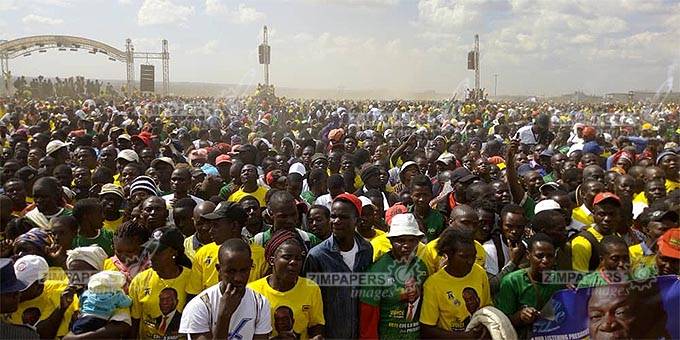EDITORIAL COMMENT: An election of firsts whose outcome is foregone

PRESIDENT Emmerson Mnangagwa on Wednesday proclaimed 30 July as the date for the holding of harmonised elections, setting the country on the path of history in many ways.
The poll is the first, since Independence in 1980, to be held without former president Mr Robert Mugabe at the helm of Zanu-PF having resigned in November last year.
After his resignation, Zanu-PF elevated President Emmerson Mnangagwa to the helm of the party, making him the ruling party’s presidential candidate in the forthcoming poll.
The elections are also the first post -2000 without both Mr Mugabe and MDC founding president Morgan Tsvangirai who died on February 14 this year.
After Mr Tsvangirai’s death, the party split along two rival factions, one headed by Mr Nelson Chamisa, also the MDC Alliance candidate in the polls and another led by Dr Thokozani Khupe.
The two factions are currently engaged in a legal battle on which of them is the legitimate one and also has rights to the MDC-T brand.
For the first time since Independence, the polls come at a time the country has a record 129 registered parties vying to contest in the elections.
The final number could actually be reduced or remain the same when the nomination court sits on June 14.
Upon his inauguration, President Mnangagwa guaranteed the local and international community that the country would hold free, fair, credible and violence free elections.
The President also invited local, regional and international observers interested to observe the national polls, saying Zimbabwe has nothing to hide and already international blocs like the European Union have indicated that they would come to observe the elections.
True to his word, the President has created a free environment for political parties to go about conducting their meetings and campaigns.
Mr Chamisa of the MDC-T, the most prominent of the parties challenging the ruling Zanu-PF, has fully utilised the free political environment albeit to expose himself as a man with little or no regard for the truth.
Zanu-PF has since November gone through a transformation in a shift from the period it was in the clutches of the G40 cabal to a mass organisation.
The President Mnangagwa administration has also sought to reposition Zimbabwe on the global stage following almost two decades of isolation.
The re-engagement drive has seen President Mnangagwa visiting a number of countries inviting investors to Zimbabwe with his “Zimbabwe is Open for Business”, mantra. His efforts have so far attracted $16 billion in potential investment towards the turnaround of the country’s economy.
He has also promised consistency in policies assuring investors that the country will respect property rights.
Locally, President Mnangagwa has moved to complete outstanding projects that have dragged for so many years under the previous administration.
Within Zanu-PF, President Mnangagwa addressed losing and winning candidates in the recent party’s primary elections in an effort to bridge any gaps so that the revolutionary party approaches the polls in one spirit.
But what could prove as the master stroke by President Mnangagwa is actually allowing a free environment for political parties. By doing that, the President has robbed the opposition of claims of old that the environment was not free and fair in their bid to delegitimise past polls.
As mentioned earlier, Mr Chamisa has been the prominent campaigner among the opposition parties and at every opportunity; he has never wasted a chance to trip himself.
If not making ludicrous promises like building spaghetti roads, airports in rural areas or bullet trains with a maximum speed of almost twice the existing ones, Mr Chamisa has used his campaign to tell the most blatant of lies earning himself a reputation regionally and internationally as a purveyor of falsehoods.
Just this week, Mr Chamisa attracted the ire of Rwandan President Paul Kagame by falsely claiming that he had helped him draft the country’s information, communication and technology policy.
President Kagame was swift in dismissing Mr Chamisa, posting on his Twitter account, “1st my name is Kagame not kagama 2 — I don’t know this man & no discussion ever happened with him anywhere . . . 3rd Rw’s ICT policy, projects & progrm started before MDC formation and politics! I wish the people of Zim. Well! (Sic).”
In January, addressing a rally in Mutare, Mr Chamisa lied about meeting United States President Donald Trump claiming that the American President promised MDC $15 billion if it wins the country’s election.
In the same month, the American Embassy in Harare issued a statement distancing its government from his utterances.
Last month, in an interview with BBC Stephen Sackur, the MDC-T president was cornered into admitting that he lied about meeting Trump.
Despite calls by President Mnangagwa for peace and calm towards elections, Mr Chamisa’s party has recorded a number of violent incidents that were confirmed to have had clearance from the party leadership.
The “commander” of the so-called Vanguard youth militia Mr Shakespeare Mukoyi revealed in an interview with the private media that they carried out violent acts on behalf of the MDC-T leadership.
“During the time when Tsvangirai was on his deathbed, my brother (Charlton) Hwende and other leaders approached me saying the situation was bad and the party needed new leadership.
“They told me that the work that they were about to do had to be done by the youth assembly, especially the Vanguard, which they are now dismissing as thugs. We fought to bring sanity in the party until we had this hierarchy that we are having today,” he was quoted saying.
“I feel betrayed that they say the Vanguard is bad, yet they are the ones who were behind the operations of the Vanguard. This is bad. Maybe, as leaders they have their wisdom to say that, but I don’t think that is right.”








Comments